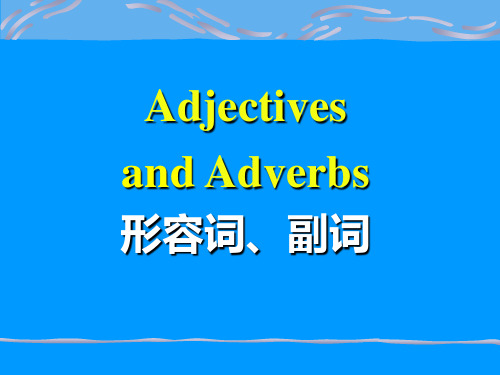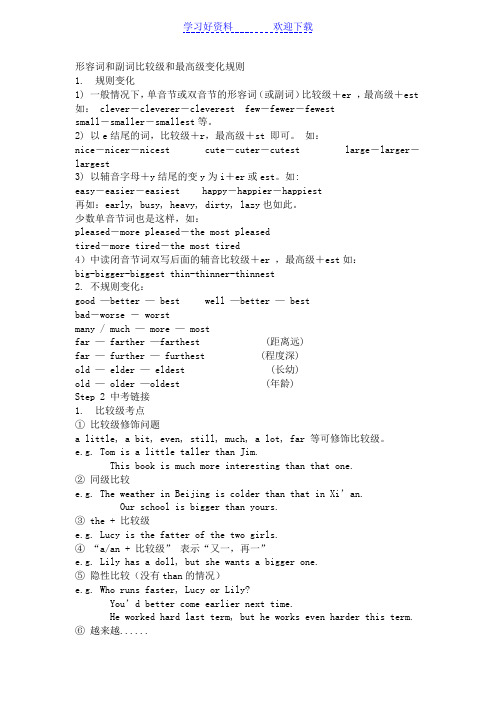形容词 or 副词
语法精讲-- 形容词、副词

5. —Let’s go shopping at the new mall.
—Why not shop online? It’s _______.
A. expensive
B. more expensive
C. less expensive expensive
D. the most
【解析】选C。由句意可知答语应为“为什么不网上购物?它 更便宜。”less expensive意为“更便宜”。
A. brave worried
B. proud
C. successful
D.
【解析】选B。brave勇敢的;proud自豪的;successful成 功的;worried忧虑的。由常识可知当刘翔在比赛中又获得第 一名时,我们应该感到自豪。故选B。
3. Why are you staying up so late playing computer games again? Stop being so _______.
, ,
官(观)
代表观点的描述性形容 词
fine好的, beautiful漂亮的, interesting有趣的
行(形)
代表表示大小、长短、 small小的, tall高的, high 高低及形状的形容词 高的, round圆的
口诀
说明
例词
令(龄) 代表年龄、新旧的形 young年轻的, old年老的, new
A. funny
B. silly
C. seriLeabharlann us【解析】选B。前句句意为“你为什么又熬夜这么晚玩电脑游 戏?”可知,下一句应为“别这么愚蠢了。”funny有趣的; silly愚蠢的;serious严肃的。
4. Farmers have become _______ in our hometown in recent years. A. more and more rich B. richer and richer C. more rich and more rich 【解析】选B。“比较级and比较级”意为“越……就越……”, rich的比较级是richer。
【二级语法】03_形容词和副词(1)

讲义·形容词和副词……的:形容词……地:副词【壹】形容词or副词一、形容词加-ly结尾构成副词的规则只有形容词+ly,才能变成副词!如果给出的是名词,或者是动词,请先把它变成形容词,再把它变形容词变成副词。
①以–l结尾的仍加–ly:careful →carefully;wonderful →wonderfully②以–le结尾的变e为y:terrible →terribly;responsible →responsibly③以辅音字母加–y结尾的,变y为i加ly:angry →angrily④tru e→truly1. I _truly_ (true) believe that travelling is one of the best things that you can do for yourself.2. _Eventually_ (eventual), I went home with my car full of groceries and my heart full of warmth and kindness.3. The researchers suggest that after a stressful day, _simply_ (simple) doing something as small as holding the door open for someone else and carrying someone’s bags can give your mooda boost.4. (2013广东)But such a small thing couldn’t _possibly_ (possible) destroy a village.二、用形容词还是副词,主要是看在句子中作什么成分副词标准位置:助动词/系动词/情态动词之后,实义动词之前。
形容词修饰:名词a very cute boy副词修饰:副词、句子、形容词、动词(谐音:“付诸行动”)very beautifulHe runs fast.He runs very fast.Honestly, ~~~~~5. In recent years, Internet voting has become _increasingly_ (increase) popular in China.6. These prices may seem expensive but in my opinion, it is a _truly_ (true) magical experience.7. Betty was having a _particularly_ (particular) hard time because her father had acted wrongly.8. In some cases, it is the term used for being _environmentally_ (environ ment) friendly.9. Not _surprisingly_ (surprise), it become an instant hit.10. _Strangely_ (strange) enough, he never fell.11. (2015广东)_Luckily_ (lucky), he also had a cow which produced milk every day.12. _Amusingly/Amused_ (amuse), the boy followed his parents out of the door.13. (2014陕西)Men and Women must be treated_equally_ (equal) in education and employment.14. (2014新课标二)A woman on the bus shouted, “Oh, dear! It’s mine.” She pushed her way to the driver and took the suitcase _thankfully_ (thank).15. Their grown children visit them _occasionally_ (occasion).16. (2014新课标一)The river was so polluted that it _actually_ (actual) caught fire and burned.17. (2013陕西)The boy looked at his father _hopefully_ (hope) because he thought his father had brought him a present.hopeful/hopeless18. However, a student attending an online course must take the time management _seriously_ (seri ous).19. (2009陕西)China Daily is _widely_ (wide) read in North America.20. (2016全国一)The title will be_officially_ (official) given to me at a ceremony in London.21. (2006 陕西)Well, you’ve acted _foolishly_ (fool) and you will pay for it.22. (2016全国二)Recent studies show that we are far more productive at work if we take short breaks _regularly_ (regular).23. Now he has become a basketball player in our school team _successfully_ (success).24. Then she closed her eyes and went _peacefully_ (peace) back to sleep.【贰】原级、比较级和最高级nice →nicer →nicestpopular →more popular →most populargood/well →better →best一、the后是形容词时常用其最高级形式(三者及三者以上)1. Some people keep dogs to protect themselves from robbery, but the _most important_ (important) reason is for companionship.2. This festival is a holiday of great significance and the one with the _longest_ (long) history.important →of great significance3. (2015课标二)The adobe dwellings(土坯房) built by the Pueblo Indians of the American Southwest are admired by even _the_ most modern of architects and engineers.二、有than时一般要用比较级4. (2014 新课标一)Finally, that hard work paid off and now the water in the river is _cleaner_ (clean) than ever.三、没有than也会用比较级的情况句中出现a bit, a little, rather, much, far, by far, a lot, a great deal, any, still, even等,有可能会使用比较级(主要还是靠翻译)5. For young visitors, the time span can be even _shorter_ (short).6. He is tall enough, but his brother is still _taller_ (tall).7. Jerry kept walking until he couldn’t go any _farther_ (far).四、than可以是介词,前后比较的是相同级别的内容8. And, of course, walking barefoot keeps your feet in good shape, so it’s actually healthier than _wearing_ (wear) shoes.五、第三长也要用最高级(the + 序数词+ 形容词)The Changjiang River is the third longest in the world.9. Antarctica, the coldest place on Earth, is the fifth _largest_ (large) continent in the world.六、the more, the more 越⋯⋯,就越⋯⋯10. (2014辽宁)The _harder_ (hard) you try to beat him, the more likely you will get hit. He controls you!11. (2011福建)The _more_ sport they do, the happier they will feel.12. (2016上海)Up to a certain point, the more stress you are under, the _better_ (good) your performance will be.七、earlier与laterthree days earlier/before三天前three days later三天后13. (2014广东)After our plane landed, we went to the hotel. We had made our reservation six months _earlier_ (early), but the man at the front desk said there had been a mistake.14. (2015课标一)But I didn’t care. A few hours _before/earlier_, I’d been at home in Hong Kong, with its choking smog.Here, the air was clean and fresh, even with the rain.'d = had done / had better'd = would do / would ratherI'd put ~~~【叁】查漏补缺一、-ed形容词和-ing形容词-ing形容词一般译作“令人…的”(对外的影响)-ed形容词一般译作“感到…的”(对内的感受)DG is boring.DG is bored.1. I felt a little _embarrassed_ (embarrass) and thought that the man had a wonderful sense of humor.2. It is _frightening_ (frighten) to think it could happen again.fright 害怕n.frighten 使…害怕vt.frighten ing令人害怕的adj.frighten ed感到害怕的adj.3. (2014新课标二)There were many people waiting at the bus stop, and some of them looked very anxious and _disappointed_ (disappoint).4. (2014新课标一)While there are _amazing_ (amaze) stories of instant transformation, for most of us the changes are gradual.5. (2014上海)Over time, the high cost of living became a little burden on my already _exhausted_ (exhaust) shoulder.exhaust 使…筋疲力尽vt.exhausting 令人筋疲力尽的adj.exhausted 感到筋疲力尽的adj.6. The moment Lang stepped into the stadium, we clapped _excitedly_ (excite).二、形容词放在状语的位置,表示主语所处的状态7. I stood at the school gate, _depressed_ (depress).I stood at the school gate, and I was depressed.8. _Puzzled/Puzzlingly_ (puzzle), Shawn followed his father into the garage.9. The farmer, _surprised_ (surprise) but happy, asked the boy how he succeeded where the rest had failed.三、以-ly结尾的未必都是副词名词+ ly→形容词形容词+ ly→副词love ly可爱的friend ly友好的brother ly兄弟般的order ly有序的time ly及时的live ly生动活泼的yearly 每年一次的monthly 每月一次的;月刊weekly 每周一次的;周报daily 每日一次的;日报man lywoman lysilly愚蠢的ugly丑陋的lonely孤独的、偏僻的deadly致命的likely可能的【肆】是时候展现真正的技术了1. Believe me, Susan. I am _truly_ (true) sorry.2. David said nothing, but _simply_ (simple) nodded, as if understanding perfectly.3. Together, they were clapping, loudly and _cheerfully_ (cheer).4. (2010陕西)I have been _deeply_ (deep) impressed by a number of experiences in her life.5. (2016全国三)Food in small pieces could be eaten easily with twigs which _gradually_ (gradual) turned into chopsticks.6. But do American students get _annoyed_ (annoy) about their uniforms, too?7. In the end, _exhausted_ (exhaust) and hot, I couldn’t go any further.8. (2015上海)It was _the nicest_ (nice) gift I’d ever received, and it was from a complete stranger.9. A few days _earlier_ (early) he had received a telegram from Lord Lloyd.10. Dai people (傣族人) believe that the _wetter_ (wet) you get, the luckier you will be.。
英语语法形容词、副词

*He does not run so (as) fast as I.
4) 可用much, still, a little, even, far,three years等表示程度的状语来 修饰比较级 *She is much taller than Mrs.Liu. *He is three years older than I. *This problem is a little more difficult than the other one.
Adjectives and Adverbs
形容词、副词
形容词:表示人或事物的性质或特征. 如:good, right, white, orange . 副词:修饰动词、形容词或其他副词, 说明时间、地点、程度等.如:now, very, here, often, quietly, slowly.
fat – fatter – fattest big – bigger – biggest thin – thinner – thinnest
规则变化
单音节词和少数双音节词
4) 以辅音字母加 y 结尾变 y
为 i 加 –er 或 –est
early – earlier – earliest easy – easier – easiest lucky – luckier – luckiest
has a rest on Sundays.
形容词和副词 比较级和最高级的构成
规则变化 单音节词和少数双音节词
1) 一般情况加 – er 或 – est
fast – fast– highest clever – cleverer – cleverest
★ alone(单独、独自)作表语=by oneself lonely(孤独的)可作表语、定语 * He lived alone, but he didn’t feel lonely. * It’s a lonely village. ★ hard(努力地) hardly(几乎不)否定副词 * She works very hard, and he hardly
形容词和副词的用法

形容词和副词的用法作用:1.形容词:(1)形容词在句中常修饰名词和代词。
A good boy. Somethi ng important(2)形容词在句中作定语、表语、宾语补足语。
Our country is a beautiful co untry.(作定语)The meal is delicious. (作表语)We keep our classroom clean and tidy.(作宾语补足语)2.副词:(1)副词在句中修饰动词、副词、形容词、全句(Luckily)。
She speaks En glish w也(2)副词在句中可作状语、表语、和定语。
He studies very hard. (作状语)When will you be back. (作表语)Luckily, I passed the exam.常用来修饰原级的词有:very , too, so, really, quite, pretty、位置1.形容词:通常要放在所修饰的名词之前,但要放在不定代词(之后。
something、anything …)2.副词:1 )多数副词作状语时放在行为动词之后。
如果动词带宾语,则放在宾语之后。
Mr. Smith works very hard._ She speaks En glishweJl.2)频度副词作状语时,通常放在行为动词之前,情态动词、be动词和助动词之后。
He usually gets up early.3)程度副词一般放在所修饰的名词前面。
I am n ever late for school.He runs very fast.形容词和副词的比较级和最高级。
大多数形容词和副词有三个等级:原级、比较级、最高级。
原级指形容词和副词的原形;比较级用来表示较……”或更……一些”;最高级则表示最……”、形容词和副词的原级:1.表示两者(A与B)在某一方面相同时用句型:A +谓语+ as +形容词或副词的原形+ as+ B.。
初中英语语法—形容词、副词 PPT课件 图文

5. They watched a movie and felt quite __A___ .
A. sad B. sadly C. sadness D. sady
形容词作宾语补 足语
某些动词如make,paint,keep,find, like,want等后接名词或代词作宾语,再接 形容词作宾语补足语,补充说明宾语的状态、 特征等。形容词和宾语一起构成复合宾 语.有的已构成固定词组。
an old big brown wooden box 一个旧而大的棕色木箱子 two tall young Japanese girls 两位高个、年轻的日本姑娘
例题
1) Tony is going camping with ___ boys. A. little two other B. two little other C. two other little D. little other two
1.He is a good student. 2. She is a beautiful girl. 3. I have a clever pet dog.
2)多个形容词做定语时的排列顺序:
口诀: 冠代数形大,新色国材名
注释: 冠----冠词;代----代词;数----数词;形----形状、 性质;大----大小、长短;新----新旧;色----颜色; 国----国家、产地;材----材料、用途;名-----名词
The windows of our classroom are cleaner than those of theirs.
形容词原级的常用句
形容词和副词比较级和最高级变化规则

形容词和副词比较级和最高级变化规则1. 规则变化1) 一般情况下,单音节或双音节的形容词(或副词)比较级+er ,最高级+est 如: clever-cleverer-cleverest few-fewer-fewestsmall-smaller-smallest等。
2) 以e结尾的词,比较级+r,最高级+st 即可。
如:nice-nicer-nicest cute-cuter-cutest large-larger-largest3) 以辅音字母+y结尾的变y为i+er或est。
如:easy-easier-easiest happy-happier-happiest再如:early, busy, heavy, dirty, lazy也如此。
少数单音节词也是这样,如:pleased-more pleased-the most pleasedtired-more tired-the most tired4)中读闭音节词双写后面的辅音比较级+er ,最高级+est如:big-bigger-biggest thin-thinner-thinnest2. 不规则变化:good —better — best well —better — bestbad-worse - worstmany / much — more — mostfar — farther —farthest (距离远)far — further — furthest (程度深)old — elder — eldest (长幼)old — older —oldest (年龄)Step 2 中考链接1. 比较级考点①比较级修饰问题a little, a bit, even, still, much, a lot, far 等可修饰比较级。
e.g. Tom is a little taller than Jim.This book is much more interesting than that one.②同级比较e.g. The weather in Beijing is colder than that in Xi’an.Our school is bigger than yours.③ the + 比较级e.g. Lucy is the fatter of the two girls.④“a/an + 比较级” 表示“又一,再一”e.g. Lily has a doll, but she wants a bigger one.⑤隐性比较(没有than的情况)e.g. Who runs faster, Lucy or Lily?You’d better come earlier next time.He worked hard last term, but he works even harder this term.⑥越来越......a. 比较级 + and + 比较级b. the + 比较级 + 句子,the + 比较级 + 句子a. e.g. It’s getting colder and colder.The more you exercise, the better you are.2. 最高级考点说明:形容词的最高级前必须加the; 副词的最高级前省略the。
形容词、副词的比较级和最高级的用法

教案设计者:审核人:授课老师:授课班级:形容词、副词的比较级和最高级的用法当两种物体之间相互比较时,我们要用形容词或副词的比较级;当相互比较的物体是三个或三个以上时,我们就要用形容词或副词的最高级。
形容词、副词的比较级和最高级的变化规律:1. 单音节形容词或副词后面直接加-er或-est:tall—taller—tallest fast—faster—fastest2. 以-e结尾的单音节形容词或副词直接加-r或-stlarge—larger—largest nice—nicer—nicest3. 以-y结尾的形容词或副词,改-y为-i再加-er或-estbusy—busier—busiest early—earlier—earliest4. 形容词或副词是重读闭音节时,双写最后的辅音字母,再加-er或-esthot—hotter—hottest big—bigger—biggest5. 多音节形容词或副词前面直接加more或mostdelicious—more delicious—most deliciousbeautiful—more beautiful—most beautiful6. 不规则变化good (well)—better—best bad (badly)—worse—worst形容词、副词的比较级和最高级的句子公式:比较级:形容词:物体A + am / are / is + 形容词比较级+ than + 物体B.I am taller than you.副词:物体A + 行为动词+ 副词比较级+ than + 物体B.He studies better than me.1八年级下册教学案例设计最高级:1)物体A + am / are / is + the + 形容词最高级+ 比较范围(of + 人/物,in +地方).I am the tallest in the class.Pasta is the most delicious food of the three.2)物体A + 行为动词+ 副词最高级+ 比较范围(of + 人/物,in + 地方).Cheetahs run fastest in the world.He studies best of us.一. 词形变换。
形容词副词

happy,friendly,careful,happily,true,real,
hard,early,carefully,truly,really,hardly,fast,
quick,quickly,good,well,bad,badly,strong,
形容词 、副词
1, ①如何区分形容词(的)和副词(地 -ly) happy-happily real-really true-truly
usual-usually bad-badly loud-loudly
lucky-luckily kind-kindly quick-quickly
polite-politely slow-slowly easy-easily
fat --- fatter --- fattest glad—gladder--gladdest
4、以“辅音字母+ y”结尾的单词,先改y为i, 再加-er或-est。除
early 外,以ly结尾的单词,一般在词前加more / most.
easy easier easiest
happy happier happiest
一,②形容词和副词在句中的位置:
1,be+形容词
I am_h_appy ( happy, happily). He is s_u_ccessful (successful, successfully). Lucy is k__ind (kind, kindly). 2,形容词+名词 I am a _h_a_ppy student. (happy, happily) He is a _su_ccessfmulan. (successful, successfully) Lucy is ak_i_nd doctor. (kind, kindly)
- 1、下载文档前请自行甄别文档内容的完整性,平台不提供额外的编辑、内容补充、找答案等附加服务。
- 2、"仅部分预览"的文档,不可在线预览部分如存在完整性等问题,可反馈申请退款(可完整预览的文档不适用该条件!)。
- 3、如文档侵犯您的权益,请联系客服反馈,我们会尽快为您处理(人工客服工作时间:9:00-18:30)。
1. Please speak ________ (slow) so that we can make full notes. 2. They all come early, but she come ________(early) of all. 3. He played the pi thought. 4. Whoever is ________(quick) is going to have the better chance. 5. This radio is even ________(expensive) than that one. 6. This trip to China has ________(real) inspired me to relearn my Mandrain. 7. John’s handwriting is the ________(bad) of the three.
形容词 or 副词?
形容词是指用来修饰、说明名词或不定代词, 表示人或物的性质、特征和状态。一般放 在它所修饰的名词前作定语,也可独立作 表语或宾语补足语等。
副词是用来修饰动词、形容词、其他副 词或整个句子,有时也能修饰名词,表示 时间、地点、方式、程度、动作、频度等, 在句中主要用作状语。
副词修饰动词,告诉我们动作是怎样进行 的,什么时候进行或者在什么地方发生的, 一般位于动词之后。副词表示频度修饰动词 时,位于连系动词和助动词之后,行为动词 之前。 副词修饰形容词或副词,则告诉我们这些 形容词或副词的程度如何,一般位于这些词 前。
8. The most used letter in the English alphabet is "E", and "Q" is the ________(little) used! 9. Those who eat most are not always ________(fat); those who read most, not always wisest. 10. The mother is ________(worry) about her son’s safety. 11. I’m going on a diet for I want to become ________ (thin). 12. In my grandfather’s time, computers were far ________ (popular) than they are today. 13. So ________ (excite) was the game that I forgot all about the coming finals. 14. Tom is ________ (tall) of all his brothers. 15. This is our ________(cheap) pen in our shop.
1. more slowly 3. more successfully 5. more expensive 7. worst 9. Fattest 11. thinner 13. exciting 15. cheapest
2. the earliest 4. quicker 6. really 8. least 10. worried 12. less popular 14. the tallest
